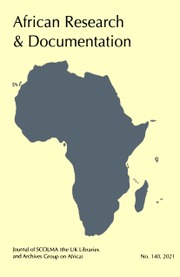No CrossRef data available.
Article contents
A Half Century of Abstracting at the African Studies Centre Leiden
Published online by Cambridge University Press: 25 April 2022
Extract
Since 1968 the African Studies Centre (ASC) in Leiden, The Netherlands, has published an abstracts journal, first under the title Documentatieblad (1968-1993), subsequently renamed African Studies Abstracts. In 2003 African Studies Abstracts went online. Renamed African Studies Abstracts Online, it also appeared in a limited print edition, principally for distribution in Africa where Internet connectivity was often problematic. However as the ICT infrastructure in African countries developed, the print edition was increasingly seen as having outlived its usefulness. The last paper copy of African Studies Abstracts Online, number 37, appeared in February 2012.
In the years since 1968 the abstracts journal has undergone a number of changes, not only in name and appearance, but also in frequency of publication and coverage, number of abstracts and types of indexes, and price. More fundamental changes are expected in the near future.
- Type
- Articles
- Information
- Copyright
- Copyright © African Research & Documentation 2013
Footnotes
My thanks go to Katrien Polman, for her critical reading and valuable comments, and to Jos Damen, for providing additional information.
References
Notes
3 Lancaster, F.W. (2003) ‘Do indexing and abstracting have a future?’, Andes de Documentation, 6, pp. 137-144.Google Scholar
4 http://thomsonreuters.com/products_services/science/free/essays/journal_selection_process(accessed 04.12.2013)
5 A monograph containing chapters written by different authors and usually with one or more editors, often but not always the result of a conference.
6 Incidentally, these doubts were not shared by the publisher.
7 For an excellent overview of the many issues involved in information retrieval in the field of African Studies, see Walsh, G. (2004) ‘“Can we get there from here?” Negotiating the washouts, cave-ins, dead-ends, and other hazards on the road to research on Africa’, The Reference Librarian, 42 (87/88), pp. 5-96.CrossRefGoogle Scholar
8 A book's “title covers contents” if it clearly indicates the subject matter and contains some form of the name of a country or region, or the name of a place, person or organisation well known in a country or region.
9 Egypt, Libya, Tunisia, Algeria, Morocco, Western Sahara
10 See note 4
11 McIlwaine, J. (1999) ‘Plus ça change: four decades of African studies bibliography', Africa Bibliography, pp. vii-xix, provides a comprehensive overview of African bibliography from the 1960s to 2000; Limb, P. (2005) ‘African studies bibliography: a state-of-the-art review', Africa Bibliography, pp. vii-xv, discusses bibliographic coverage of Africa in the digital age.
13 Eijkman, E., (2008) ‘CODESRIA African Indexation Project: report on a consultative meeting in Dakar, Senegal’, African Research & Documentation, 106, pp. 101.Google Scholar
14 QIAPL was created in 1991 and maintained by the Overseas Office of the American Library of Congress in Nairobi. It stopped in 2011.
16 http://www.ilissafrica.de/en/the internet library Subsaharan Africa;>Bergenthum, H. , & Siebold, T. , (2010) ‘African Studies - striving for integrated information services: recent developments in Germany and Europe’, Africa Spectrum, 45 (2), pp. 109-121.CrossRefGoogle Scholar




